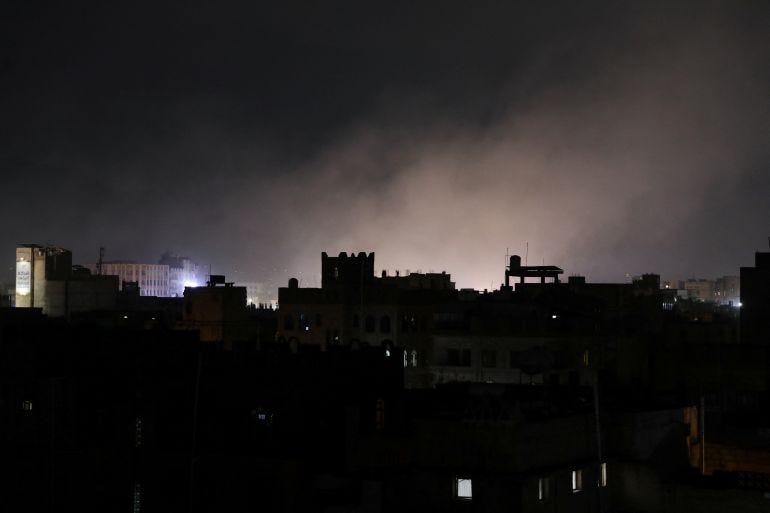Trump’s Yemen Airstrikes: Guns, Cash, and Another Bloody Chapter in a War Without End
Donald Trump’s latest airstrikes in Yemen killed at least nine civilians — the latest addition to a death toll that has already spiraled into the hundreds of thousands. Trump’s justification was simple: the strikes were a response to Houthi aggression in the Red Sea. But Yemen’s civilians didn’t get to weigh in on that decision — they just paid for it with their lives.
The numbers are grim. Since the conflict began in 2014, Yemen’s war has claimed an estimated 377,000 lives, according to the United Nations Development Programme (UNDP). Most didn’t die from bombs or bullets — about 60% of those deaths were caused by hunger, disease, or destroyed infrastructure. The airstrikes — mostly carried out by Saudi-led forces armed with American weapons — have targeted everything from marketplaces to water treatment plants to school buses.
In 2018, a Saudi airstrike hit one of those buses, killing 40 children. The bomb that killed them was manufactured in the United States.
Trump’s role in fueling this disaster began with his much-publicized $110 billion arms deal with Saudi Arabia in 2017. Trump hyped the deal as a major win for American jobs — a triumph of “America First” foreign policy. But closer analysis from the Brookings Institution revealed the truth: most of that $110 billion was fluff — old contracts and vague letters of intent. The deal’s true value was smaller, but still large enough to ensure Saudi Arabia remained well-supplied with American-made bombs.
In 2019, after the murder of Jamal Khashoggi, Congress tried to halt arms sales to Saudi Arabia in a rare bipartisan move. Trump vetoed it. The relationship with Riyadh — and its lucrative defense contracts — remained untouchable.
Then there’s Jared Kushner. After leaving his White House role, Kushner’s new investment firm, Affinity Partners, landed a $2 billion investment from Saudi Arabia’s Public Investment Fund — a deal that came with red flags. The fund’s own advisory panel warned against investing in Kushner’s firm, calling it “inexperienced and problematic.” But Crown Prince Mohammed bin Salman — the same man U.S. intelligence concluded ordered Khashoggi’s murder — pushed the deal through anyway.
The timing wasn’t subtle. Kushner had spent years fostering ties with MBS from inside the White House, reportedly working around traditional diplomatic channels to keep a direct line open with the crown prince. By the time Trump left office, Kushner’s firm was rewarded with a multi-billion-dollar windfall — one that critics argue looked suspiciously like payment for services rendered.
Now, Yemen is back in Trump’s crosshairs. His recent airstrikes targeted Houthi positions in Sanaa, reportedly in response to Red Sea shipping attacks. But while the Pentagon framed it as a “measured” response, reports from Al Jazeera and Reuters confirmed that civilians were among the dead — at least nine, with more wounded.
This isn’t strategy — it’s business. Saudi Arabia has spent years turning Yemen into a charnel house with American-made bombs, and Trump has been eager to play arms dealer. His administration’s support for the Saudi coalition was never about stability or security — it was about feeding the defense industry and preserving ties with a crown prince willing to throw billions at Trump’s inner circle.
The truth is, Trump’s so-called “anti-war” stance was always a marketing ploy. He criticized Bush’s wars while quietly expanding drone strikes, vetoed efforts to rein in Saudi aggression, and turned a blind eye to Khashoggi’s brutal murder. Now, with Yemen’s death toll climbing higher, he’s returned to the same playbook — another round of bombs, another set of civilian casualties, and another round of excuses.
For Yemen, the war hasn’t stopped since 2014 — and thanks to Trump’s latest intervention, it’s not ending anytime soon.



We as Americans need to be informed on these issues. Thank you
I disagree with many things that Trump does. I also disagree with missiles being fired at ships that legally transit the area or at neighboring countries. If you do that, expect retaliation. If retaliation comes, expect death and destruction. Don't blame anyone except your own leadership.